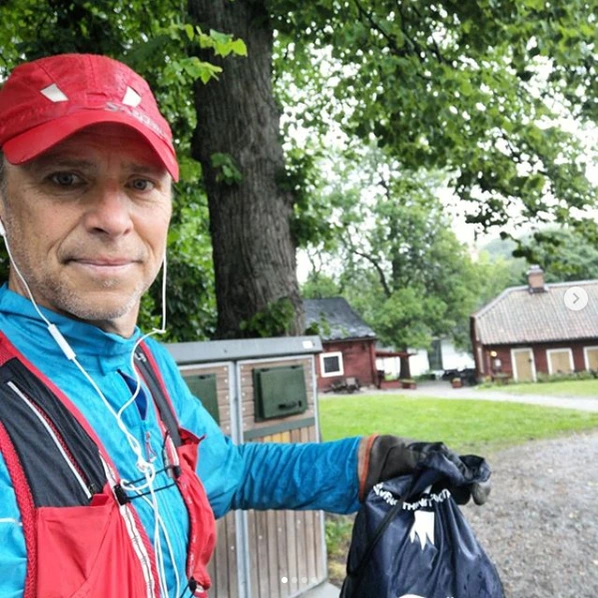- History of plogging.
- Where and how to do plogging.
- How do you become a plogger?
- What do you need to know before leaving for an Eco-jogging and what do ploggers collect?
1. History of plogging
Plogging refers to the process of collecting garbage while jogging, and the term is the result of the fusion of two words: “plocka” (Swedish: lift) and “jogging“.
Plogging originated in Sweden in 2016 as a sporting activity and quickly spread to all countries, mainly through social media.
Swedish ecologist Erik Ahlström, a fan of light jogging in the fresh air, moved from a small town to Stockholm. He was very impressed by the amount of garbage in the streets of the capital. He then began to carry bags with him during training, putting everything he found on the street inside them.

In addition, he created the website Plogga.se to find and reward volunteers on the internet. The site is also available in English, so you can familiarize yourself with the general concepts and events of this movement.
Briton David Sedaris, one of the founders of plogging, combined garbage collection with exercise, taking up to 60,000 steps a day in search of local garbage. He was so much effective in keeping his area clean that the local authority named a garbage truck by his name.

In addition, the novel movement immediately became part of the traditional original “Hygge” lifestyle, based on the link with nature and its protection.
2. Where and how to do plogging?
The events organized for enthusiasts can have different levels:
- Plogging “at home” – cleaning the neighborhood, yard;
- At school or college level, involving a group of friends or a sports team;
- “Corporate” plogging – a great way to unite the company’s team, have fun in the fresh air and do a good deed;
- Organization of regional events;
- Conferences and projects at municipal or national level.
It is also a great informative event that participants can share on social networks and thus draw attention to the problems associated with waste and environmental pollution.
Don't like running? No problem!
Apart from plogging, you can do eco kayaking and eco diving or simply walk along the beaches and collect garbage.
Now, unfortunately, garbage is present practically everywhere, so it is not surprising that “exotic” activities such as eco-climbing have also emerged. Congratulations to the activists of the Eco-Everest movement who removed 13,500 kg of garbage from the highest mountain in the world!

A movement like Planet Patrol (formerly Plastic Patrol) has shown great efficiency, which, in addition to combining physical activity and garbage collection, aims to collect useful data, for example, indicate the places of pollution on a map, take photographs of objects among the garbage to understand which are the most polluting brands for nature. They create waste maps, analyze the data and conduct relevant environmental studies based on data collected by volunteers.

3. How do you become a plogger?
You simply need to:
- Wear comfortable clothes and sneakers.
- Bring one, or preferably two, sturdy garbage bags with you. During the ride, you can hang them from the left and right sides to distribute the load evenly.
- Collect garbage found along the way.
- You can take a picture of the “treasure” and post the photo with the hashtag #plogging on Instagram.
Congratulations, you have become a plogger!
4. What do you need to know before leaving for an Eco-jogging and what do the ploggers collect?
Rule 1. Plogging shouldn’t be a record-breaking run or a health risk. Its main goals are to actively and usefully spend time in the fresh air, as well as to make the place where you live more comfortable and cleaner. It helps to regain harmony with nature and increase environmental awareness. Parents or educators who practice plogging set a great example to their children by promoting a culture of caring for the environment.
Rule 2. Ploggers are not professional cleaners and do not have the task of cleaning up huge landfills. If you find such a landfill, you need to contact the municipality that has adequate equipment and personnel.
Rule 3. Strict hygiene rules must be observed and protective gloves and garbage bags must be used. The waste collected should therefore be separated accordingly to its type and disposed of in a proper way.

So it’s all simple! Plogging can be a great hobby and, to some extent, also a psychological therapy, because by helping other people and nature you help yourself. You become better, more aware, you set a good example to other people. Remember the phrase “Think globally, act locally”? And plogging is a great way to make your small but very important local contribution!








Portal Wielojęzyczny
14/05/2025 at 08:36This piece is a beautiful blend of wisdom and simplicity — it makes you think deeply while keeping things accessible.
Kol3ktor 🙂
13/05/2025 at 11:08In a world where writing often feels rushed and fragmented, your words come across as deliberate and full of intent. They invite the reader into a space where they can breathe and reflect, offering moments of stillness amidst the noise. What you’ve written is more than just a collection of ideas; it’s an invitation to pause, to think, and to truly absorb the beauty of what is being shared.
XMC.PL
12/05/2025 at 14:52Each sentence builds on the last, creating a sense of momentum that makes it impossible to stop reading.
Polish News
03/05/2025 at 19:57Like a gentle breeze in the heat of day, your words bring clarity, calm, and a renewed sense of wonder.
Kol3ktor 🙂
03/05/2025 at 18:01Your writing speaks to the soul. It doesn’t just touch the intellect; it resonates on a deeper level, making the reader pause and reconsider the way they see the world. I find myself thinking about your words long after I’ve finished reading, and I know this is a piece I’ll return to again and again.
vorbelutr ioperbir
24/04/2025 at 12:20I discovered your blog site on google and check a couple of of your early posts. Proceed to keep up the superb operate. I just further up your RSS feed to my MSN News Reader. Seeking forward to reading more from you afterward!…
money casino
15/04/2025 at 10:26This website, you can find a great variety of slot machines from top providers.
Visitors can try out retro-style games as well as modern video slots with vivid animation and exciting features.
Whether you’re a beginner or an experienced player, there’s always a slot to match your mood.
casino slots
Each title are available 24/7 and designed for PCs and tablets alike.
All games run in your browser, so you can get started without hassle.
The interface is easy to use, making it convenient to find your favorite slot.
Sign up today, and discover the world of online slots!
zoritoler imol
15/04/2025 at 08:21Hello my friend! I wish to say that this post is amazing, nice written and include almost all important infos. I would like to see more posts like this.
casino games
12/04/2025 at 10:25On this platform, you can access a great variety of online slots from top providers.
Players can experience traditional machines as well as feature-packed games with high-quality visuals and exciting features.
Even if you’re new or a casino enthusiast, there’s always a slot to match your mood.
casino games
All slot machines are ready to play round the clock and compatible with PCs and mobile devices alike.
You don’t need to install anything, so you can jump into the action right away.
The interface is user-friendly, making it quick to find your favorite slot.
Join the fun, and enjoy the thrill of casino games!
What is a mommy massage
18/01/2025 at 22:18I am constantly seeking for new info on this kind of important theme, and was especially delighted when ever I find sites that happen to be well-crafted and well-researched.
Thanks for offering this kind of good awareness, and I also expect reading more out
of your weblog in the long run.
tlovertonet
17/01/2025 at 13:12Hi there would you mind letting me know which web host you’re working with? I’ve loaded your blog in 3 completely different browsers and I must say this blog loads a lot quicker then most. Can you suggest a good internet hosting provider at a honest price? Many thanks, I appreciate it!
Add a comment